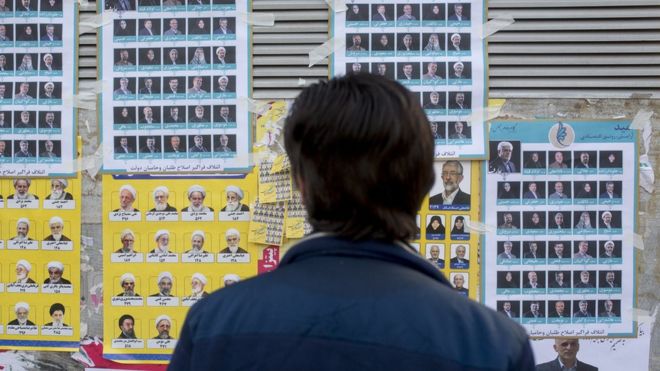Iran elections: Moderates ‘colluded’ with West, says hardliner

A leading Iranian cleric has accused reformists of colluding with the West to block hardline appointments to the country's Assembly of Experts.
Millions of Iranians voted on Friday for members of the assembly, which appoints Iran's supreme leader, and also in parliamentary elections.
Reformists and moderates have won all the seats in the capital Tehran.
But Sadeq Larijani said reformists had worked with "American and English media outlets" during the poll.
"Is this type of coordination with foreigners in order to push out these figures from the Assembly of Experts in the interests of the regime?" he said in a statement.
Early results gave former President Ali Akbar Hashemi Rafsanjani, a moderate conservative, and Iran's reformist President Hassan Rouhani the most votes for the assembly.
The vote for the assembly has assumed added significance given that Iran's Supreme Leader, Ayatollah Khamenei, is 76 and has suffered ill-health.
It is the first time Iranians have gone to the poll since last year's landmark nuclear deal and the lifting of international sanctions.
The parliamentary result in Tehran is significant because lawmakers from the capital usually determine the political direction of the house, analysts say.
But with a mixed vote outside the capital neither the reformist or hardliners are likely to have overall control of parliament.
Analysis: Lyse Doucet, BBC News international correspondent
This stunning election result will make a difference in Iran's engagement with the wider world.
President Rouhani's hand has been strengthened in parliament to help open his country to greater trade and investment. That will help him, and others in his reformist camp, to deepen the dialogue with the West, which began with negotiations on a landmark nuclear deal.
But much of this opening will continue to be with Europe, rather than the US. Iran's relationship with America is still complex and controversial.
Iran's ambitions in the region are also deeply rooted — it has strategic interests in countries like Syria, Iraq and Lebanon as well as Afghanistan, and a strong sense of its right to remain engaged.
These are areas where Iran's powerful Revolutionary Guards and its conservative Supreme leader hold sway.
But Iran wants to be regarded as an equal partner, able to sit at the world's top tables to work on common threats like the so-called Islamic State. President Rouhani's team may now feel empowered to engage a bit more, more often.
What is the Assembly of Experts?
Mr Rouhani said on Saturday that the election was an endorsement of his efforts to end Iran's international isolation.
"The competition is over. It's time to open a new chapter in Iran's economic development based on domestic abilities and international opportunities," the official Irna news agency quoted him as saying.
Despite securing the nuclear deal he has faced resistance at home to domestic reform.
Ayatollah Khamenei said the turnout, at 60%, showed "the brilliant face of religious democracy to the world", Iran's conservative Tasnim news agency reported.
But he also urged "vigilance" against what the agency called "foreign meddling".
BBC Persian's Ali Hamedani says the economy was a key issue in the process.
With sanctions lifted and Western investors beginning to return to Iran, there are high hopes for an improvement in daily life, he says.
Политика конфиденциальности | Правила пользования сайтом









